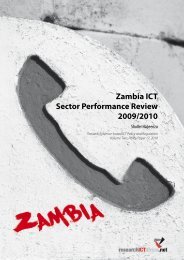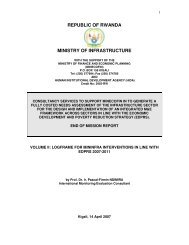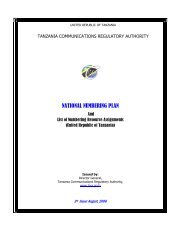Benin Telecommunications Sector Performance Review 2007
Benin Telecommunications Sector Performance Review 2007
Benin Telecommunications Sector Performance Review 2007
Create successful ePaper yourself
Turn your PDF publications into a flip-book with our unique Google optimized e-Paper software.
<strong>Benin</strong><br />
big cities, especially in Cotonou and Porto Novo. The costs and the<br />
availability of lines in a reasonable time are factors that obstruct the<br />
operation of this technology across the national territory.<br />
There is still no autonomous regulatory body in the ICT sector in <strong>Benin</strong>.<br />
The decision to set up such a body has been announced but postponed<br />
several times. The ministry in charge of ICTs currently acts as the regulatory<br />
authority. It is usually assisted in its duties by the incumbent operator,<br />
Bénin Télécoms SA.<br />
<strong>Benin</strong> also does not have an integrated ICT policy implemented by a single<br />
autonomous agency. This is despite Government authorities’ public<br />
commitment to promote access to information and communication to foster<br />
sustainable development.<br />
A healthy regulatory environment is crucial for the development of the<br />
telecommunications sector. It is not easy to appraise the regulatory<br />
framework of a country like <strong>Benin</strong> which does not yet have an<br />
autonomous regulatory body that is independent of public authorities.<br />
The study on the telecommunications regulatory environment uses the<br />
perception assessment method designed for this purpose by LIRNEasia.<br />
The findings of this study, amongst other things, enable a better understanding<br />
of the difficulties that hamper the harmonious development of<br />
the ICT sector in <strong>Benin</strong>.<br />
Introduction<br />
BACKGROUND<br />
Two simultaneous trends have had an impact on innovation and the<br />
economy: technological revolution and globalisation, which together<br />
usher in the new era of networks. Integration into these networks seems<br />
to be the way forward for the development of countries of the South<br />
(UNDP, 2001). Accordingly, the vision of contemporary society, called the<br />
information society, is based on irreversible mid-term prospects, that all<br />
forms of economic, social, cultural and political activities increasingly<br />
depend on telecommunications and information services. Thus, economic<br />
globalisation triggers an extension and an expansion of networks.<br />
It is via the Internet, that information which constitutes a new vector of<br />
economic and social development flows.<br />
Access to information in real time offers a wide range of opportunities<br />
capable of kick-starting rapid development in other economic and<br />
social sectors, in particular education and training, health, transport,<br />
administration, industry, urban and rural councils, etc. In this connection,<br />
stepping up the use of Information and Communication Technologies<br />
(ICTs) in the South should become a strategic priority for<br />
governments. This acceleration is even more important in that it will<br />
make it possible to reduce the digital divide between the South and<br />
the North. <strong>Benin</strong>, just like other sub-Saharan African countries, follows<br />
this trend.<br />
The advent of new technologies, particularly the Internet, in the Republic<br />
of <strong>Benin</strong> has aroused general passion in government services, private<br />
enterprises and in individuals. This is evidenced through the nationwide<br />
establishment of businesses offering various ICT services (Cybercafes,<br />
8 <strong>2007</strong> <strong>Telecommunications</strong> <strong>Sector</strong> <strong>Performance</strong> <strong>Review</strong>
















